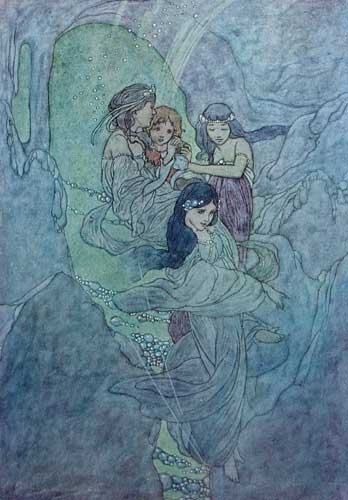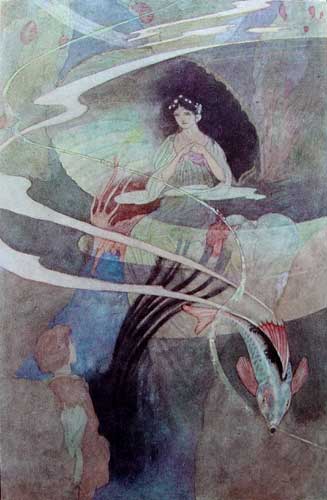| |
Chapter 16
King Loc did not laugh long; on the contrary, he hid the face of a very
unhappy little man under his bedclothes.
Thinking of George of the White Moor, prisoner of the Sylphs, he could
not sleep the whole night. So, at that hour of the morning when the dwarfs
who have a dairymaid for a friend go to milk the cows in her place while
she sleeps like a log in her white bed, little King Loc revisited Nur
in his deep well.
“Nur," he said to him, “you did not tell me what he was
doing among the Sylphs."
The old Nur thought that King Loc had gone out of his mind, and he was
not very frightened, because he was certain that King Loc, if he became
mad, would certainly turn into a graceful, witty amiable, and kindly madman.
The madness of the dwarfs is gentle like their sanity and delightfully
fantastic. But King Loc was not mad; at least he was not more so than
lovers usually are.
“I mean George of the White Moor," he said to the old man,
who had forgotten this young man as completely as possible.
Then the learned Nur arranged the lenses and the mirrors in a careful
pattern, but so intricate that it had the appearance of disorder, and
showed to King Loc in the mirror the very shape of George of the White
Moor, such as he was when the Sylphs carried him off. By properly choosing,
and skilfully directing the instruments, the dwarf showed the lovelorn
king the whole adventure of the son of that countess who was warned of
her end by a white rose. And here expressed in words is what the two little
men saw in the reality of form and colour.

When George was carried away in the icy arms of the daughters of the
lake, he felt the water press his eyes and his breast, and he thought
it was death. Yet he heard songs that were like caresses, and he was steeped
in a delicious coolness. When he opened his eyes again he found himself
in a grotto; it had crystal pillars in which the delicate tints of the
rainbow shone. At the end of this grotto there was a large shell of mother-of-pearl,
irisated with the softest colours: it was a canopy spreading over the
throne of coral and weeds where sat the queen of the Sylphs. But the aspect
of the sovereign of the waters had lights softer than the sheen of mother-of-pearl
and of crystal. She smiled at the child brought to her by her women and
let her green eyes rest on him long.

“Friend,” she at length said to him, “welcome in our
world, where you will be spared every pain. For you, no dry books or rough
exercises, nothing coarse that recalls the earth and it’s labours,
but only the songs, the dances, and the friendship of the sylphs.”
So the blue haired women taught the child music, waltzing, and a thousand
amusements. They loved to bind on his forehead the shells that starred
their own locks. But he, thinking of his country, gnawed his fists in
impatience.
The years went by, and George’s wish to see the earth again was
unchanged and fervent, the hardy earth burnt by the sun, frozen by the
snow, the native earth of sufferings and affections, the earth where he
had seen, where he wished to see Bee again. Now he was growing into a
big boy, and a slight golden down ran along his upper lip. Boldness came
to him with his beard, and one day he appeared before the queen of the
Sylphs, and having bowed, said to her:
“My lady, I have come, if you deign to permit it, to take leave
of you. I am going back to the Clarides.”
“Dear friend,” the queen answered, smiling, “I cannot
grant you the leave you demand, for I keep you in my crystal manor to
make you my friend.”
“My lady,” George replied, “I feel unworthy of so great
an honour.”
“This is the effect of your courtesy. No good knight ever thinks
he has done enough to win the love of his lady. Further, you are yet too
young to know all your merits. Be sure, dear friend, that nobody wishes
you anything but good. You only have to obey your lady.”
“My lady, I love Bee of Clarides, and I will love no other lady
but her.”
The queen, very pale, but still more beautiful, cried:
“A mortal woman, a gross daughter of men, this Bee, how can you
love that?”
“I do not know, but I know that I love her.”
“Very well, you will recover.”
And she detained the young man in the delights of the crystal manor.
He did not know what a woman was, and was more like Achilles among the
daughters of Lycomedes than Tannhauser in the magic mountain. So he wandered
gloomily along the walls of the immense palace, looking for an opening
to run away; but on all sides he saw the floods enclosing his luminous
prison in their mute and magnificent kingdom. Through the transparent
walls he watched the anemones bloom and the coral flowering, while purple,
azure, and golden fish sparkled and sported above the delicate madrepores
and the glistening shells. These marvels did not interest him; but lulled
by the delicious songs of the sylphs, he slowly felt his will give way,
and his whole soul dissolve. He was all slackness and indifference, when
he found by chance in a gallery of the palace an old worn book of vellum,
studded with copper nails. The book, found in a wreck at the bottom of
the sea, dealt with chivalry and ladies, and there were told at length
stories of the adventures of heroes who went through the world fighting
against giants, redressing wrongs, protecting widows, and assisting orphans
for the love of justice and the honour of beauty.
George flushed and grew pale in turn with admiration, shame, and anger
at the tale of these splendid adventures. He could not contain himself:
“I also,” he cried, “will be a good knight! I also will
go through the world punishing the wicked and helping the unhappy for
the good of men and the name of my lady Bee.”
Then his heart grew great with courage. He strode with drawn sword through
the crystal mansions. The white women fled and vanished before him like
silvery waves of a lake. Their queen alone saw him come upon her unmoved.
She fixed on him the cold look of her green eyes.
He rushes to her; he cries;
“Unclasp the charm which you have thrown on me. Open the road to
earth. I wish to fight in the sun like a knight. I wish to return to love,
to suffer, and to struggle. Give me back the true life and the true light.
Give me action and achievement; if you do not I will kill you, wicked
woman!”
She shook her head smiling, to say “no.” She was beautiful
and calm. George struck her with all his strength. But his sword broke
against the glittering bosom of the queen of the Sylphs.
“Child!” She said.
And she had him shut up in a kind of crystal funnel which formed a cell
under the manor; round it sharks prowled, opening their monstrous jaws
armed with a triple row of sharks teeth. And it seemed as if at each charge
they must break the thin partition of glass; it was not possible to sleep
in this strange cell.
The point of this submarine funnel rested on a rocky bottom which was
the dome of the furthest and the least known cavern of the Empire of the
dwarfs.
This is what the two little men saw in the course of an hour as exactly
as if they had followed George all the days of his life. The ancient Nur,
after having displayed the cell scene in all it’s sadness, spoke
to King Loc much in the way a showman when he has shown the magic lantern
to the little children.
“King Loc,” he said to him, “I have shown you all you
wished to see, and, your knowledge being perfect, I can add nothing to
it. I am not anxious to know whether what you have seen has pleased you;
it is enough that it is true. Science takes no account of pleasing or
displeasing. It is inhuman. It is not science, it is poetry which charms
and consoles. That is why poetry is more necessary than science. King
Loc, go and compose a song.”
King Loc went out of the well without speaking a word.
Previous Chapter Next
Chapter
|
